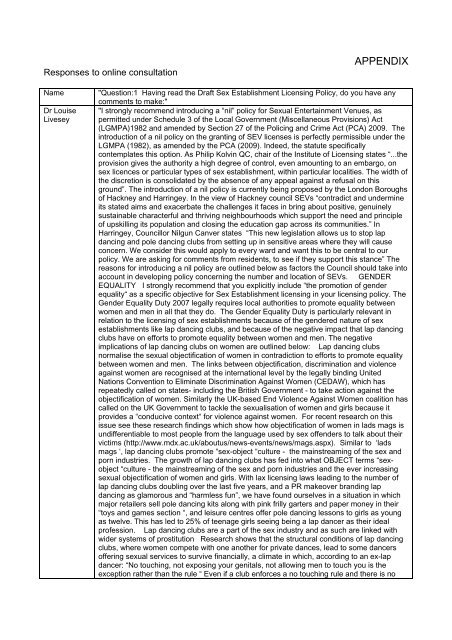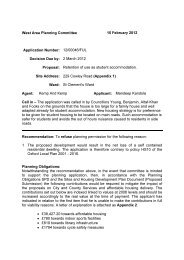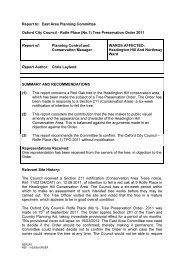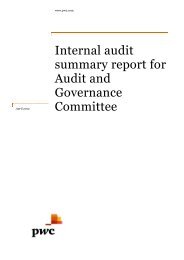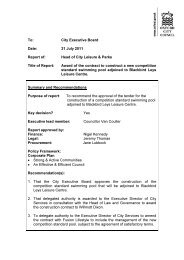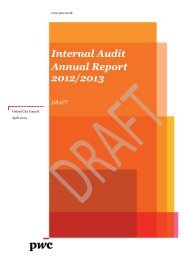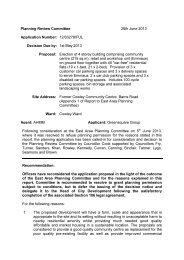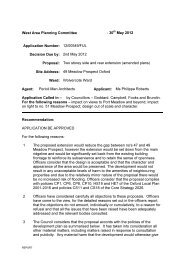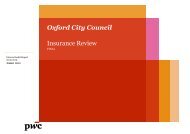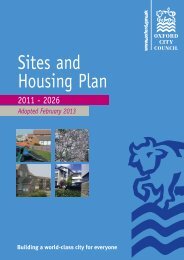Draft Sex Establishment Policy - Appendix , item 11. PDF 8 MB
Draft Sex Establishment Policy - Appendix , item 11. PDF 8 MB
Draft Sex Establishment Policy - Appendix , item 11. PDF 8 MB
Create successful ePaper yourself
Turn your PDF publications into a flip-book with our unique Google optimized e-Paper software.
Responses to online consultation<br />
APPENDIX<br />
Name<br />
Dr Louise<br />
Livesey<br />
"Question:1 Having read the <strong>Draft</strong> <strong>Sex</strong> <strong>Establishment</strong> Licensing <strong>Policy</strong>, do you have any<br />
comments to make:"<br />
"I strongly recommend introducing a “nil” policy for <strong>Sex</strong>ual Entertainment Venues, as<br />
permitted under Schedule 3 of the Local Government (Miscellaneous Provisions) Act<br />
(LGMPA)1982 and amended by Section 27 of the Policing and Crime Act (PCA) 2009. The<br />
introduction of a nil policy on the granting of SEV licenses is perfectly permissible under the<br />
LGMPA (1982), as amended by the PCA (2009). Indeed, the statute specifically<br />
contemplates this option. As Philip Kolvin QC, chair of the Institute of Licensing states “...the<br />
provision gives the authority a high degree of control, even amounting to an embargo, on<br />
sex licences or particular types of sex establishment, within particular localities. The width of<br />
the discretion is consolidated by the absence of any appeal against a refusal on this<br />
ground”. The introduction of a nil policy is currently being proposed by the London Boroughs<br />
of Hackney and Harringey. In the view of Hackney council SEVs “contradict and undermine<br />
its stated aims and exacerbate the challenges it faces in bring about positive, genuinely<br />
sustainable characterful and thriving neighbourhoods which support the need and principle<br />
of upskilling its population and closing the education gap across its communities.” In<br />
Harringey, Councillor Nilgun Canver states “This new legislation allows us to stop lap<br />
dancing and pole dancing clubs from setting up in sensitive areas where they will cause<br />
concern. We consider this would apply to every ward and want this to be central to our<br />
policy. We are asking for comments from residents, to see if they support this stance” The<br />
reasons for introducing a nil policy are outlined below as factors the Council should take into<br />
account in developing policy concerning the number and location of SEVs. GENDER<br />
EQUALITY I strongly recommend that you explicitly include “the promotion of gender<br />
equality“ as a specific objective for <strong>Sex</strong> <strong>Establishment</strong> licensing in your licensing policy. The<br />
Gender Equality Duty 2007 legally requires local authorities to promote equality between<br />
women and men in all that they do. The Gender Equality Duty is particularly relevant in<br />
relation to the licensing of sex establishments because of the gendered nature of sex<br />
establishments like lap dancing clubs, and because of the negative impact that lap dancing<br />
clubs have on efforts to promote equality between women and men. The negative<br />
implications of lap dancing clubs on women are outlined below: Lap dancing clubs<br />
normalise the sexual objectification of women in contradiction to efforts to promote equality<br />
between women and men. The links between objectification, discrimination and violence<br />
against women are recognised at the international level by the legally binding United<br />
Nations Convention to Eliminate Discrimination Against Women (CEDAW), which has<br />
repeatedly called on states- including the British Government - to take action against the<br />
objectification of women. Similarly the UK-based End Violence Against Women coalition has<br />
called on the UK Government to tackle the sexualisation of women and girls because it<br />
provides a “conducive context“ for violence against women. For recent research on this<br />
issue see these research findings which show how objectification of women in lads mags is<br />
undifferentiable to most people from the language used by sex offenders to talk about their<br />
victims (http://www.mdx.ac.uk/aboutus/news-events/news/mags.aspx). Similar to ‘lads<br />
mags ‘, lap dancing clubs promote “sex-object “culture - the mainstreaming of the sex and<br />
porn industries. The growth of lap dancing clubs has fed into what OBJECT terms “sexobject<br />
“culture - the mainstreaming of the sex and porn industries and the ever increasing<br />
sexual objectification of women and girls. With lax licensing laws leading to the number of<br />
lap dancing clubs doubling over the last five years, and a PR makeover branding lap<br />
dancing as glamorous and “harmless fun”, we have found ourselves in a situation in which<br />
major retailers sell pole dancing kits along with pink frilly garters and paper money in their<br />
“toys and games section “, and leisure centres offer pole dancing lessons to girls as young<br />
as twelve. This has led to 25% of teenage girls seeing being a lap dancer as their ideal<br />
profession. Lap dancing clubs are a part of the sex industry and as such are linked with<br />
wider systems of prostitution Research shows that the structural conditions of lap dancing<br />
clubs, where women compete with one another for private dances, lead to some dancers<br />
offering sexual services to survive financially, a climate in which, according to an ex-lap<br />
dancer: “No touching, not exposing your genitals, not allowing men to touch you is the<br />
exception rather than the rule “ Even if a club enforces a no touching rule and there is no
premises of the age of each of the performers<br />
• No fee to be charged by any club to a performer for working in the club<br />
• Police to be kept informed of any assaults that take place on staff, whether or not<br />
the victim wishes to press charges<br />
• “No smoking areas to be allowed at the front of clubs to minimise the potential for<br />
harrassment of women living, working and passing through the area.<br />
• All smoking areas must be in private areas away from public spaces.<br />
• No advertising allowed in media that is not exclusively aimed at adults - this would<br />
exclude local family newspapers for example.<br />
These vital conditions would go some way to protecting women working in lap dancing clubs<br />
and women in the wider community. I myself have experienced verbal and threatening<br />
behaviour from ‘patrons ‘ at The Lodge since it's opening (whilst accessing the skating rink<br />
car park). This has included harassing comments, lewd jokes and attempts to grab my<br />
breasts and bottom. As such I now consider that area to be a ‘no-go ‘ zone for me as a<br />
woman. I further request that you monitor the impact of the “frequency exemption “which<br />
was included within the SEV licensing regime. As you will be aware, this exemption means<br />
that establishments hosting lap dancing less than 12 times in a year do not require an SEV<br />
licence or even a temporary event notice. We are extremely concerned about this<br />
exemption because you will have no powers to prevent these performances from occurring<br />
or place any conditions or controls on them. Yet venues hosting lap dancing less than once<br />
a month are less likely to have facilities and procedures in place to protect the safety of<br />
performers - such as a separate changing room, CCTV and security. The safety of the<br />
performers is thus put at risk by this exemption. I therefore ask you to attempt to monitor<br />
performances that are staged under the frequency exemption and to convey your<br />
experiences of this back to the Government. This is crucial because the power to amend<br />
or repeal the frequency exemption was included in the Policing and Crime Act 2009 in<br />
recognition of the fact that the frequency exemption could prove problematic for local<br />
authorities. I recommend that the policy requires members of licensing subcommittees<br />
who wish to sit in hearings of relevance to gender (i.e. SEVs; sex establishments and so on)<br />
to have completed up to date basic training in gender equality and equality legislation. I am<br />
very concerned about the way in which the licensing of The Lodge has taken place and,<br />
moreover, the very limited scope of the consultation which has not specified taking advice<br />
from the Oxford <strong>Sex</strong>ual Abuse and Rape Crisis Centre, from women's safety organisations<br />
or from women's groups more generally. I recommend that, in the absence of legal direction<br />
to the contrary, the Licensing Committee maintain a register of interested parties in<br />
reference to SEVs, sex establishments and so on, who will be informed by the Licensing<br />
Committee when applications are received of potential relevance for gender equality. This<br />
will ensure that the Council will be seen to fulfil its obligations to operate in a transparent<br />
and accountable manner. While it is true that both men and women have been active in<br />
making representations about the negative impact on society of SEVs, it is also true that the<br />
majority of those who reflect and take action on the harm of SEVs are women. This could be<br />
because the lived experience of sexual objectification, sexual discrimination, sexual<br />
harassment and sexual violence in many womens lives plays a part in the extent to which<br />
these issues are given serious consideration and weighed against other interests or values<br />
in the context of SEV licensing.<br />
Therefore I request and recommend that:<br />
• The working party of officers and councillors is at least equally gender balanced<br />
• The policy should make reference to good practice in SEV applications being heard<br />
by sub-committees that are at least equally gender balanced.<br />
I would also like to point out the cross party support for tackling the growth of lap dancing<br />
clubs at a national level and locally. Leader of the opposition, Ed Miliband “We need to<br />
think about how our culture treats women more generally. The vital work of organisations<br />
such as OBJECT has exposed the ease with which lap dancing clubs have sprung up. In<br />
government we took some steps to enforce stricter controls on these establishments, but we<br />
were too slow to recognise this problem and act on it. I have already pledged that I want<br />
local people to have more power to challenge the licences of these establishments.”<br />
Home Secretary, Theresa May at the Women’s Aid Conference 2010: “It is only when<br />
businesses appreciate their responsibility to end the sexualisation of women that some<br />
people will stop treating women like objects. And it’s only when our communities stand up<br />
and say violence against women is unacceptable - that attitudes will really begin to change”.
Dr Kate<br />
Mckenzie<br />
Mary Locke<br />
Michele<br />
Paule<br />
Sarah Wild<br />
(Name<br />
removed)<br />
Susan mary<br />
Bennett<br />
(Name<br />
removed)<br />
Athene Reiss<br />
The Conservative Violence Against Women and Girls Strategy for London (2010 - 2013) :<br />
‘The proliferation of lap dancing clubs and brothels may further legitimise violence against<br />
women and undermine efforts to prevent it... We will ensure that the safety issues<br />
presented by lap dancing clubs come under local authority and police scrutiny through JEM.<br />
The Mayor will work with local authorities to review the implementation of the new licensing<br />
regime under the Policing and Crime Act 2009 to ensure that London leads the way in<br />
regulating lap dancing clubs as sexual entertainment venues and giving local people the<br />
power to object to lap dancing clubs in their area. We will support boroughs in ensuring that<br />
the proliferation of lap dancing clubs is controlled. We will also champion any police<br />
operations that target lap dancing clubs to investigate any misconduct or criminal activity. I<br />
am aware that some lap dancing club operators have threatened to appeal against the<br />
rejection of a <strong>Sex</strong>ual Entertainment Venue (SEV) licence on the grounds that it violates their<br />
human rights under the Human Rights Act 1998 and that the two rights they threaten to<br />
invoke are the right to freedom of expression and the protection of property. However, it is<br />
extremely unlikely that such an appeal would be successful considering that it is within the<br />
law for councils to set nil policies. Furthermore, the two rights specified above are qualified,<br />
they are not absolute. Philip Kolvin QC, Chairman of the Institute of Licensing, states<br />
“Where a rational decision has been taken by the licensing authority in accordance with the<br />
principle of the statute, it is most unlikely that the decision will be held to have been a<br />
disproportionate interference with human rights”. Indeed, before the Policing and Crime Bill<br />
became law - enabling local authorities to licence lap dancing clubs as <strong>Sex</strong>ual<br />
Entertainment Venues under the LGMPA - the Minister of the Crown in charge of the Bill<br />
made a written statement that the new law, including the provision to set nil policies, was<br />
compatible with the Human Rights Act 1998. Thus the power of local authorities to set a nil<br />
policy for <strong>Sex</strong>ual Entertainment Venue licenses has been validated in human rights terms.<br />
I would very much appreciate receiving written reports of any decisions taken pertaining to<br />
the recommendations that we have set out in this document. Sincerely, Dr Louise<br />
Livesey"<br />
"I oppose this policy since there is increasing evidence of the link between sex<br />
establishments, prostitution and violence against women."<br />
I feel that this is totally wrong for Oxford. It is not correct Oxford is a place where people live<br />
work there are many young there at university also. Having Oxford become the like soho or<br />
Amsterdam is tacky and wrong. I am totally against this I also feel it will have a detrimental<br />
affect to tourism and the standing the city has.<br />
We should not be considering any such establishments. They are exploitative and contribute<br />
to a hostile envorinmnet for all women living and working in the city. Permitting them sends<br />
out a message that the council and citizens find this unobjcetionable - as a long-term<br />
resident and employee within the city I object to them in the strongest terms<br />
"3.2 c In this parait says that the council will not exceed the number that the council<br />
consider appropriate for that area. But no mention is made of what 'number' is considered<br />
appropriate. In the Cowley Road there are too many 'sex' premises even though in 9.4 it<br />
states that consideration will be given to not putting sex places near schools, play areas,<br />
residential areas, places of worship, shopping complexes. Do not put any more sex venues<br />
in East Oxford."<br />
"All such establishments promote the sexual exploitation of women, and their treatment in a<br />
less than human way. A city of Oxford's standing should ensure that it has no such<br />
extablishments, and if it rejects that as a moral position, any such estabishment allowed<br />
should be well away from shops, houses, scholls and entertaiment centres, perhaps on an<br />
industrial estate and not on the Cowley Road or City centre, where all three are plentiful."<br />
I am writing to support sections 8 c and 8d of the policy which seeks to limit the number of<br />
sex establishments and to take account of the nature of the local area when a licence is<br />
applied for.<br />
"We represent the holder of an existing SEV, The Lodge on Oxpens Road. Our clients feel<br />
that the policy as currently expressed is fair and reasonable on the basis that it currently<br />
does not seek to set a quota for the number of SEV licences within a particular locality and<br />
that each application should be judged on its own merits."<br />
"Oxford City should be characterised as a relevant locality on the basis of the number of<br />
historic buildings, schools, shopping centres, residential areas and places of worship. <strong>Sex</strong><br />
clubs in particular should be banned from the City. At the moment we have the distressing<br />
sight near the train station (and en route between the centre and a significant family
Susan<br />
Tanner<br />
Sushila Dhall<br />
Ann Furtado<br />
(Name<br />
removed)<br />
margaret<br />
ferriman<br />
Julia Drown<br />
residential area) of a billboard advertising a so-called gentleman's club next to one for a<br />
children's theatrical event. This encourages children to look up and see first the childfriendly<br />
sign and then across to the adult-themed sign. This teaches children some very<br />
undesirable messages about the role of women in their world. Please stop these clubs from<br />
opening, and certainly from advertising."<br />
"I believe that sexual entertainment licences should not be granted for any premises in<br />
Oxford. The form of entertainment which these establishments provide is not conducive to<br />
the public good and is likely to lead to violence against women, not only in the immediate<br />
area but elsewhere."<br />
"I would recommend the City adopt a policy which would enable it to refuse applications<br />
wherever possible. <strong>Sex</strong> entertainment generally means women being exploited and treated<br />
as objects for the pleasure of men. Amongst sex workers there is a very high level of acute<br />
poverty and need, even desperation, which is exploited by sex entertainment venues. The<br />
sorts of men who are willing to attend such establishments are the sorts of men we would<br />
not wish to have drunk and generally sexually aroused on the streets of Oxford after the<br />
venues close. I would recommend we set a 'zero cap' for Oxford, and give ourselves the<br />
means to protect Oxford's citizens and visitors from sex entertainment establishments."<br />
"I believe that the city of Oxford as a whole is an inappropriate locality for sex entertainment<br />
venues. Oxford is a small city, and there is no part of central Oxford which does not include<br />
residential clusters and related amenities such as schools, children's play areas, places of<br />
worship, etc. In addition, all areas of central Oxford, and other high-traffic areas where sex<br />
entertainment venues would be likely to seek to establish in order to be commercially viable<br />
(such as East Oxford), all contain shopping complexes, and an established night time<br />
economy where it would be unsuitable to include sex entertainment venues. This is<br />
particularly clearly the case when taking into account the frequency with which women<br />
report increased sexual harassment in the areas around sex entertainment venues.<br />
Regardless of how well managed individual establishments are, the conditions of work in all<br />
sex entertainment venues are exploitative and unacceptable, by their very nature as sex<br />
entertainment venues. There should be a complete ban on these establishments, there is no<br />
such thing as an acceptable sex establishment. Young women are lured into prostitution<br />
and the normalising of these establishments by allowing them to trade further degrades the<br />
status of women and of sex as something that is 'an entertaiment' instead of something to<br />
be shared between men and women as part of a private relationship."<br />
"I would like to affirm that I understand there are no <strong>Sex</strong>ual Entertainment Venues in<br />
Cambridge, where the local population similarly includes a high number of women students.<br />
I would like to apply this zero tolerance policy to Oxford as well. My belief is that SEVs<br />
provide a context where women's rights are not protected and where they are held in<br />
disrespect. I also believe that the risk of violence towards women is higher when women's<br />
bodies are sold as such a commodity."<br />
"Only to reaffirm that I consider that such activities are to be deprecated and to suggest that<br />
if Oxford City Council were to ban them within its boundaries, it could be a start to similar<br />
banning in other council areas , so not only being helpful locally but eventually nationally."<br />
"As a local resident of Oxford and a mother of two young children I would urge councillors to<br />
rule out all sex establishments - and certainly all new sex establishments - in the City<br />
because of the damage that they would cause to the City’s reputation, crime and disorder<br />
and affect on young people. The City centre is relatively densely populated. It is known<br />
virtually worldwide for its historic buildings and tourist attractions which do not fit well with<br />
sex establishments. The economic benefits to the City of tourism are huge and should not<br />
be put at risk by the approval of any sex establishments. The City also has many facilities<br />
which are used by families - the museums alone are a fantastic resource for families,<br />
students and schools. <strong>Sex</strong> establishments close to any of these areas, or indeed close to<br />
any of the shopping areas would detract greatly from these family facilities and be<br />
economically disastrous for these areas. We have more than a normal number of students<br />
in the City, not only University students some of whom are as young as 17 but also many<br />
younger students at English language schools . <strong>Sex</strong> establishments are inappropriate near<br />
the areas young students are using. In all these areas and near places of religious worship<br />
all applications should be refused because a licence in these circumstances would greatly<br />
change the character of the area - I certainly wouldn’t want children to be near these sex<br />
establishments. I would expect the impact on crime and disorder and certainly on the<br />
feeling of safety of women in these areas to be greatly disadvantaged if sex establishments
(Name<br />
removed)<br />
Sue Ledwith<br />
(Name<br />
removed)<br />
Ashleigh<br />
Griffin<br />
Kate Clayton-<br />
Hathway<br />
were approved. I'd support the approach for no sex establishments across the City. The<br />
current club at the Old Coven feels inappropriately located opposite a further education<br />
college which caters for students as young as 14 and with a nursery for very young children<br />
on this college site and next door to an ice rink which is used by families. I’d urge<br />
councillors to respect the great heritage we enjoy in Oxford and not put our worldwide<br />
reputation as a great City at risk by approving sex establishments."<br />
"I am aware that the establishment The Lodge has been advertised outside the Train<br />
Station. I object to this being the first thing that people see when they walk into Oxford and I<br />
feel this will impact on the 'Oxford brand' adversely, I also wonder if the implications,<br />
nationally and internationally, have been thought through of sending these kind of<br />
messages about what visiting Oxford stands for. It may open a market which will deter<br />
potential visitors. The establishment the Lodge has opened near to the ice rink and to<br />
residential housing. Many young people frequent the ice rink at all hours. It does seem<br />
there is a provision in the act to protect areas which have residential housing/children near<br />
to them and I do not understand why this power has not been invoked. All the areas outlined<br />
covered by this policy have residential housing nearby. Could this be a potential lever in<br />
achieving a blanket policy It seems from the information sent out that the very weak policy<br />
suggested is the result of a perception that to do otherwise would compromise the City<br />
legally. I feel more needs to be done to look at possibilities. In my opinion the idea that the<br />
comodifying of women can be achieved safely, as some of the press coverage seems to<br />
suggest, is naiive in the extreme. It is a mixed message to men,women, and children to<br />
suggest to women they should exersise caution at night and at the same time open a<br />
lapdancing club in the vicinity of a well loved venue for teenagers. I believe the only<br />
responsible stance is to find appropriate legal support to keep Oxford from becomming a<br />
home for those entrepreneurs who cannot find a safer and more healthy outlet for their<br />
business urges and sexuality. I also think this is a completely different debate from that<br />
surrounding the legalising of prostitution and the two debates should not be confused. We<br />
go to a lot of trouble to keep our areas clean, safe and family friendly. It is disheartening that<br />
it appears the law may not support the daily efforts of local people."<br />
"I believe that sexual entertainment such as lap and pole dancing are demeaning both to<br />
women and to men, and can also constitute a threat to the public, especially women's<br />
safety. I do not believe that places where such practices [or so-called entertainment] are<br />
carried out should be licensed in Oxford, and call on the City Council to phase out existing<br />
venues and to not issue any further licences. The Lodge/Coven in Oxpens Road is one such<br />
venue and I object to it being given a licence; it is in a residential area, and specifically is<br />
very close to the Ice Rink in Oxpens Road which itself is open late and where many young<br />
people/children are regular attenders. I understand too that there is a large advertisement<br />
for this venue at Oxford's train station. This is quite inappropriate to the city and its culture."<br />
"The establishment of any business related to the sex industry needs careful regulation.<br />
Allowing lap dancing or pole dancing clubs into Oxford represents not only an<br />
acknowledgement of demeaning women to simply sexual beings but also invites related<br />
issues surrounding danger to women, exposure to children and so forth. As a city that<br />
thrives on its reputation as being a centre of learning and excellence, we should encourage<br />
this not the establishment of sex related business, such as pole dancing."<br />
"Having read the <strong>Draft</strong> <strong>Sex</strong> <strong>Establishment</strong> Licensing <strong>Policy</strong> I would like to urge the council to<br />
think again before adopting this policy. I moved to Oxford two years ago from an area in<br />
another city where sex industry establishments had proliferated and the effect of this was to<br />
entirely degrade the area both in terms of general quality of the living environment and,<br />
consequently, the commercial success of surrounding shops and businesses. I had to walk<br />
past lap dancing bars with my young daughter every day and answer her questions about<br />
the posters in the window. At a more fundamental level, every council should do whatever it<br />
can to prevent the growth of the sex industry, which by its very nature is exploitative and<br />
degrading to women. I would like to live in a civilised town that took a stand against the<br />
prevailing casual attitude to the practise of making money from naked women. The evidence<br />
that these places result in a rise of violent crime and crimes of a sexual nature against<br />
women is equivocal as far as I am aware but the effects of the rise of the sex industry on our<br />
communities and especially on our young people is far more pervasive and unquantifiable."<br />
"As a long-time Oxford resident, I'm saddened that I even need to respond to such a<br />
consultation. As a city which is world-reknowned for education and learning we should not<br />
allow sex clubs of any description within its centre. The millions of visitors every year, who
jane darke<br />
(Name<br />
removed)<br />
(Name<br />
removed)<br />
Stuart West<br />
Bobbie<br />
Nichols<br />
visit because of our world-wide reputation will no doubt be shocked at anything so seedy on<br />
view. If such clubs are opened in a location away from the centre (I'm sure the colleges<br />
won't want to be sullied by them), we then create a ‘ghetto ‘, ie, an area known for going to<br />
a lapdancing club. I think this can then create a no-go area for women (but also couples<br />
and families) who should be free to walk around Oxford without passing queues of drunken<br />
men waiting to pay for women to touch them. I also feel that lapdancing clubs are<br />
degrading to the women who work in them, and can leave them vulnerable to customers,<br />
especially where there's drink involved. What guarantees have the council saught about the<br />
safety of the women employed there Finally, I think the location of the Thirst Lodge is<br />
completely unacceptable: right next to an ice-skating rink which is a venue for families and<br />
young people. And opposite a college: why should the young women who attend OCVC<br />
working for a better future have to look out at a sex club whilst they study The council<br />
should be ashamed of themselves."<br />
"Yes: please add 'Leisure establishments likely to be used by children and young people',<br />
and 'colleges used by young people under 18' to the categories of premises whose<br />
proximity to a proposed sex establishement may be grounds for refusal."<br />
I feel strongly as a local resident that lap dancing establishments would be undesirable and<br />
harmful to our community and bad for the reputation of the city.<br />
"The Gentlemans Club in Thames street is opposite a college which pupils from the age of<br />
14 upwards attend, on the way to the ice rink which lots of kids attend, and near a nursery<br />
and Church and residential housing. However I should imagine the same applies to pretty<br />
much any location in the city and understand that the Council could introduce a nil policy -<br />
from Guardian - 'Since April this year there had been a fightback from councils after new<br />
legislation re-classified the clubs as ‘sex entertainment venues ‘. Around 11 councils have<br />
brought in a ‘nil policy ‘ - saying sex entertainment venues are unsuitable in their borough;<br />
others have brought in restrictions on numbers. In ‘nil policy ‘ areas with existing clubs,<br />
owners will have to apply for new licenses that are unlikely to be granted - effectively closing<br />
them down. Eight clubs in North Tyneside may close after the policy comes into force in<br />
February, while in Tower Hamlets councillors are awaiting the results of a public<br />
consultation that could determine the future of their 11 clubs. I also suggest all councillors<br />
read ' Stripped: The Bare Reality of Lap Dancing by ex lap top dancer Jennifer Hayashi<br />
Danns, with Leveque Sandrine' Some quotes below from an interview with author... . ‘It's<br />
like an abusive relationship where you get worn down slowly – your morality gets<br />
worn down, your self esteem gets worn down. But you are there because you have put<br />
yourself there. That's what can be damaging. ‘ .. I 'became a commodity. ‘In my personal<br />
life if men said to me, 'I'm really into black girls,' I would think, 'what an arsehole,' because<br />
they are treating you as a species and as though all black women are identical. But in a lapdancing<br />
club it's almost inevitable - you are reduced to your component parts. ‘ Her<br />
confident relationship with her body crumbled too. Nine months into her lap-dancing career,<br />
Danns had a breast enlargement. Danns says the emphasis was always on women's<br />
submission and anything that marked her as an equal, from education to age, would be<br />
hidden. ‘It's about power and you play into that. ‘ Finally, she says, she decided that:<br />
‘putting myself in that situation was disrespecting myself, and undervaluing the contribution I<br />
could make to life ‘. Yet it was not until she left that she realised how damaging lap-dancing<br />
could be. ‘While you are dancing you don't talk about it - because if you are not going to<br />
stop, what possible value is there in letting [those thoughts] fester That's why I would<br />
question research which only talks to people who are still working. ‘ Danns hopes her<br />
book will persuade others that this industry harms men and women alike. ‘There's<br />
something uncomfortable and unbalanced in a fully clothed man paying a woman to strip<br />
naked. ‘"<br />
"I object to Lap-Dancing clubs in Oxford on the grounds of: (a) impact on women's safety,<br />
both local residents of all ages and the female student population; (b) the importance of<br />
Oxford's image to its tourist and University industries."<br />
"As a regular visitor to Oxford I am extremely concerned about the licensing of a lap-dancing<br />
club in Oxpens. Firstly, and most importantly, these establishments demean both the<br />
women who work there and the clients who frequent them. They perpetuate the belief that<br />
women's only role is to titillate and serve men. It may be argued that nobody forces women<br />
to work there (this may not be true in some cases), but in these straitened economic times<br />
young women may be forced to take up such employment as there is little else available.<br />
Secondly, the location of the club next to the ice rink and opposite the FE college, both of
(Name<br />
removed)<br />
Diana Tickell<br />
(Name<br />
removed)<br />
Eileen Pirie<br />
(Name<br />
removed)<br />
which are used mostly by young people is unsatisfactory. Thirdly, there is anecdotal<br />
evidence that local residents are extremely unhappy about the location of this club in close<br />
proximity to their houses because of noise and increased traffic (taxis waiting for hire etc.).<br />
For all these reasons, I recommend that you do not renew the license of this club when it<br />
expires and you do not issue any more licenses to sex establishments in the City of Oxford."<br />
"We should not have any sex entertainment venues in the City. Men who come out of them<br />
in a state of sexual arousal are more likely to commit offences such as rape and domestic<br />
violence. We should certainly not allow them near places where young people go, such a<br />
near the ice-rink: large numbers of youngsters come out of that in the early hours of the<br />
morning, such as the junior ice-hockey teams, of which there are several."<br />
I consider it very important NOT to issue <strong>Sex</strong> <strong>Establishment</strong> licences for Lap Dancing. This<br />
is a dangerous occupation for the girls employed and very bad for the reputation of this city.<br />
This is an exploitative area and not one to have. Young people should be able to live here<br />
un threatened and should find employment in a safe environment. We want to be proud of<br />
our city - not ashamed of it.<br />
I think that Oxford's historical reputation will be damaged by allowing sex establishments to<br />
open in the city. It cannot improve our tourist/acedemic economy if we become an unsafe<br />
destination for students and young people<br />
"I feel very strongly that with our young population of students and our diverse ethnic<br />
population we should not allow sex advertising and activity to spoil the attraction of Oxford<br />
as a wholesome and attractive place for all of us to live and work, by allowing lap-dancing<br />
etc clubs to advertise their sites or their activities. In fact, I do not think we should allow<br />
them to exist at all in our city."<br />
"Firstly, taking into consideration the historic character of the city centre and the huge focus<br />
on education for men and women in the city, it seems a reasonable ground not to have sex<br />
establishments in the city centre, since there are both universities and schools in the city<br />
centre which may be in close proximity. Secondly, activities within an establishment are<br />
obviously licensed, but may well create an increase in danger , for women especially, in a<br />
locality where attitudes towards women are fuelled by the entertainment offered in sex<br />
establishments."


